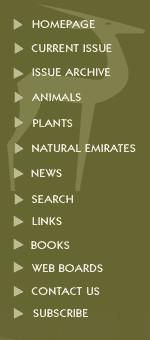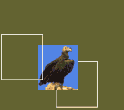|
 By Peter Wright By Peter Wright
The EPAA's role in combating the illegal trade in wildlife is to inform the Sharjah Government on the current species lists of CITES (Convention on the International Trade in Endangered Species), of which the UAE is a signatory. Animals that are confiscated within the Emirate of Sharjah under these regulations are handed over to the EPAA and are held at the Breeding Centre for Endangered Arabian Wildlife in Sharjah for veterinary treatment and rehabilitation.
Staff members of the Breeding Centre have given up many a night's sleep to hand-feed the dozens of malnourished and dehydrated cheetah cubs of North African origin. The list of other species that have been received includes African grey parrots, Arabian oryx, blue monkey, caracal, coypu, deer, gazelles, houbara bustard, lions, python, rhesus macaque (monkey) and tortoises.
Treating confiscated animals poses a very real health risk to the staff responsible for looking after them. Many of these animals are sick, and there are over 40 known diseases that can be transferred to humans. These include anthrax, brucellosis, leptospirosis, Lyme disease, tuberculosis, visceral larva migrans, rabies and yellow fever. Some of these diseases can be fatal. Primates carry the highest risk of causing disease, and can transmit exceptionally virulent infections such as Ebola virus and HIV. In 1997 a 22 year old female worker at a primate centre in the United States of America died from a herpes virus infection 42 days after biological material (possibly faecal) from a rhesus macaque monkey splashed into her eye.
 The ordeal for the surviving smuggled animals does not end once they have reached their final destination. Most of the animal buyers have no more knowledge or empathy for these animals than do the dealers themselves. Chimpanzees are dressed in nappies and kept in the household, acquiring habits from their owners such as smoking and drinking alcohol. Cheetah have been used to "hunt" gazelles and wild sheep on farms in Arabia. The cheetah, being hand-raised, has no skill in killing the animal that it has eventually chased down and caught, which ensures a slow and painful death for the prey. The ordeal for the surviving smuggled animals does not end once they have reached their final destination. Most of the animal buyers have no more knowledge or empathy for these animals than do the dealers themselves. Chimpanzees are dressed in nappies and kept in the household, acquiring habits from their owners such as smoking and drinking alcohol. Cheetah have been used to "hunt" gazelles and wild sheep on farms in Arabia. The cheetah, being hand-raised, has no skill in killing the animal that it has eventually chased down and caught, which ensures a slow and painful death for the prey.
Most illegally imported animals sold by traders end up in private collections. Enclosures are all too frequently totally inadequate, the animals often having hardly enough space to turn around or lie down in. These poor creatures are also commonly subject to torment, and if they are unlucky live in these conditions for 10 years or more until they die.
 There are however a few private collections that do provide a sanctuary for animals and serve a conservation function in the UAE. These facilities are well-managed, run along the same lines as many private safari parks in Europe and the United States and co-operate on international breeding programmes for endangered species. Unfortunately the reputations of these sanctuaries are affected by the many poorly managed collections that exist in the region. There are however a few private collections that do provide a sanctuary for animals and serve a conservation function in the UAE. These facilities are well-managed, run along the same lines as many private safari parks in Europe and the United States and co-operate on international breeding programmes for endangered species. Unfortunately the reputations of these sanctuaries are affected by the many poorly managed collections that exist in the region.
This problem is by no means confined to Arabia. It is a worldwide phenomenon that requires urgent action in all of the affected countries. Education will not stem the tide of animals entering the Arabian countries. Dedicated law enforcement units, such as the ones established in Europe, Africa and the United States, are urgently needed. These "wildlife police" have the power to apprehend offenders who face the full rigours of the law.
Every time I close my eyes I see the faces of these doomed animals, and they tell me that something is not quite right in a world where the value of wildlife is measured in its exportability per unit - fixed to the dollar.
All material on this page is copyrighted by Trident Press Ltd and/or individual contributors.
Unauthorised use of photographs or text is strictly prohibited.
|
|




 By Peter Wright
By Peter Wright The ordeal for the surviving smuggled animals does not end once they have reached their final destination. Most of the animal buyers have no more knowledge or empathy for these animals than do the dealers themselves. Chimpanzees are dressed in nappies and kept in the household, acquiring habits from their owners such as smoking and drinking alcohol. Cheetah have been used to "hunt" gazelles and wild sheep on farms in Arabia. The cheetah, being hand-raised, has no skill in killing the animal that it has eventually chased down and caught, which ensures a slow and painful death for the prey.
The ordeal for the surviving smuggled animals does not end once they have reached their final destination. Most of the animal buyers have no more knowledge or empathy for these animals than do the dealers themselves. Chimpanzees are dressed in nappies and kept in the household, acquiring habits from their owners such as smoking and drinking alcohol. Cheetah have been used to "hunt" gazelles and wild sheep on farms in Arabia. The cheetah, being hand-raised, has no skill in killing the animal that it has eventually chased down and caught, which ensures a slow and painful death for the prey.  There are however a few private collections that do provide a sanctuary for animals and serve a conservation function in the UAE. These facilities are well-managed, run along the same lines as many private safari parks in Europe and the United States and co-operate on international breeding programmes for endangered species. Unfortunately the reputations of these sanctuaries are affected by the many poorly managed collections that exist in the region.
There are however a few private collections that do provide a sanctuary for animals and serve a conservation function in the UAE. These facilities are well-managed, run along the same lines as many private safari parks in Europe and the United States and co-operate on international breeding programmes for endangered species. Unfortunately the reputations of these sanctuaries are affected by the many poorly managed collections that exist in the region.